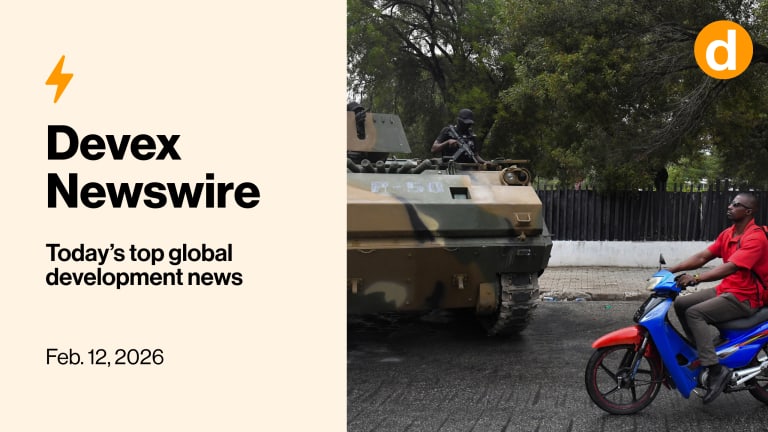
SAMASTIPUR, India — Six days before some 72 million people were scheduled to go to the polls in the eastern state of Bihar, the Bharatiya Janata Party announced its manifesto which touted the promise of a free COVID-19 vaccine for everyone in the state, if the party was elected. This sparked heated debates, questioning the ethics and substance of such a promise in India’s first major state election since the pandemic started.
The manifesto and the criticism that followed prompted the central health minister, also from BJP, to announce that everyone in India would get a free COVID-19 vaccine. But experts are wary, and say that the party is exploiting people’s fears.
Part of our series
COVID-19 and the Polls
As the pandemic rages on, elections continue across the world. In this series, we explore how COVID-19 has affected people’s choices at the ballot, how health features on political agendas, and the wider repercussions of voter choices during the pandemic.
Even as India’s daily count has gone down in the last couple of weeks, compared to highs in September, it is still the country with the second-highest number of positive COVID-19 cases in the world, at over 8 million cases. In states like Bihar, public health infrastructure remains substandard and COVID-19 fatigue is taking over. At a time like this, the promise of a vaccine might seem like a panacea, but not everyone is convinced.
“I’m glad in a way that health is the number one agenda item on the manifesto, but as public health professionals, it’s not what we would like to see. We would rather talk about health systems that can respond to needs of the population, especially in a state like Bihar where health indicators continue to be worrisome,” global health and bioethics researcher Anant Bhan told Devex.
“We didn’t get masks or gloves when we went out, and we put our lives at risk. They didn’t care about us then, and now that it’s time to ask for our votes, they want to give us free vaccines?”
— Jayanti Kumari, community health workerLeveraging anxiety
Jayanti Kumari, a community health worker in the district of Samastipur, has been fighting the coronavirus on the frontlines — conducting door to door surveys of foreign workers arriving in the state, helping to test the community, and spreading awareness of preventive measures against COVID-19.
Health workers like Kumari are called accredited social health activists, or ASHAs, which means hope in several Indian languages. Their services are voluntary, and they are paid an honorarium for specific tasks. For many ASHAs across the state, the frustration about the promise of a COVID-19 vaccine is palpable.
“We didn’t get masks or gloves when we went out, and we put our lives at risk. They didn’t care about us then, and now that it’s time to ask for our votes they want to give us free vaccines?” Kumari asked.
Bihar has the highest number of outbound migrants in the country, and thousands had to return home after they lost their jobs in other states after a strict lockdown was implemented across the country in March.
Rama Baru, a professor at the Centre of Social Medicine and Community Health at the Jawaharlal Nehru University in Delhi calls the move to take advantage of an election to make a promise when a vaccine doesn’t yet exist “unethical.”
“The government has constantly played up a lot of anxiety around COVID-19. Especially in Bihar, where a large number of migrants had to return home during the lockdown, the experience of COVID-19 is very fresh in the memories,” Baru told Devex over the phone.
She also pointed to the fact that national immunization programs in India come under the central government’s responsibilities, and promises like this cannot be made unequivocally by the state governments.
“When you promise a vaccine to all of Bihar, you are triggering some kind of vaccine subnationalism, because ultimately every state will say we’re as important as Bihar. And then would the BJP play favorites?” she asked.
Fixing fragmented health systems
Rather than fixating on the vaccine, the government should focus on preparedness of the health system to tackle the pandemic, experts say.
Opinion: Elections and COVID-19 — what we learned from Ebola
Over 40 countries around the world have elections scheduled in the remainder of 2020. To avoid a democracy crisis sparked by COVID-19, governments should heed the lessons from Liberia’s experience with elections and Ebola.
Bihar did not fare well in a 2019 health index, which was published in association with the World Bank, performing worse than it did in 2017-18. It reported deterioration of most health indicators, including those on health worker vacancies, functional 24/7 primary health care centers, and birth registration.
“In a state like Bihar where there are a number of districts that don’t have functional PHCs [primary healthcare centers], how is this [vaccine distribution] going to roll out? There is no transparency. We need to ask questions about storage, distribution, and coverage of the vaccines too,” Baru said.
A successful vaccination drive would require at least 80% coverage, which will be impossible to achieve with a fragmented health system, she said.
Experts also emphasized the need to build trust amongst people, given the fact that administering the vaccine to everyone won’t be possible even when it’s ready.
For ASHAs like Kumari, that is an added responsibility — and one, where yet again, the government seems to be a hindrance rather than a support.
She says people in her village have stopped wearing masks and are increasingly wary of government-instituted rules around social distancing. While millions of people lost jobs due to the lockdown, political rallies continued to be crowded in the run-up to the election, making people believe that the coronavirus was a political conspiracy, she said.
Despite the downsides of this vaccine promise, it is the first time health has made it high on the political agenda. But merely signaling that the vaccine will resolve everything will not be enough, Baru warned.
While it is natural that COVID-19 will remain a main feature of future elections, in India and across the world, the pandemic has shown us that health is also a major security issue, Bhan said.
“After this, every election should be fought on a health plank — but not in these individual silos around vaccines, etc., but from a comprehensive universal health care perspective,” he added.








